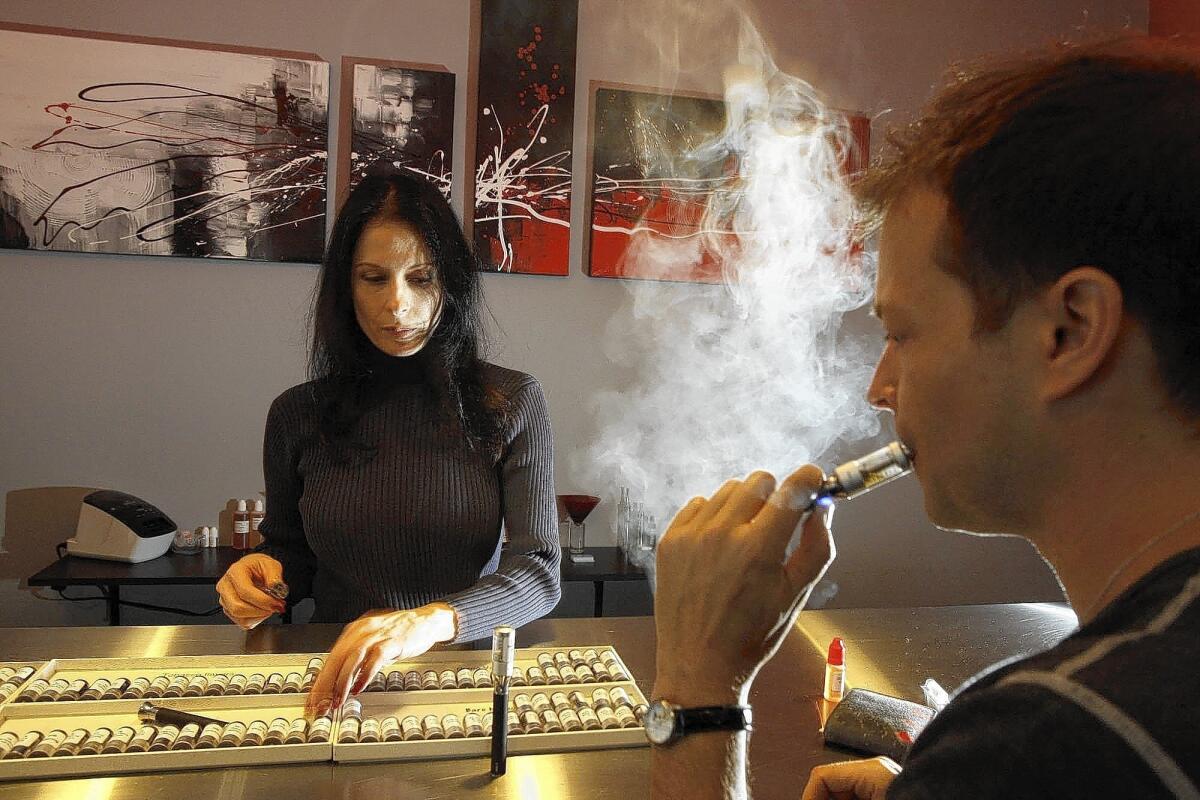San Francisco keeps e-cigarette ban as voters reject repeal measure once backed by Juul

- Share via
San Francisco’s upcoming ban on the sale of e-cigarettes will move forward after voters overwhelmingly rejected a ballot measure Tuesday that aimed to overturn the prohibition.
Roughly 80% of voters cast ballots against Proposition C, which had sought to repeal a law passed by the Board of Supervisors in June that suspended the sale of electronic cigarettes in the city until the products are reviewed by the U.S. Food and Drug Administration. Just over 19% of ballots cast were in favor of the measure.
The landmark law, which is set to take effect in January, made San Francisco the first major U.S. city to ban the sale of e-cigarettes. Last month, the Los Angeles City Council announced it also was considering a ban on the product amid reports that more than 1,000 people had been diagnosed with severe lung problems linked to vaping.
City Atty. Dennis Herrera, who co-authored the city’s legislation, sharply criticized San Francisco-based e-cigarette manufacturer Juul Labs LLC — once a key supporter of Proposition C — for “spending millions trying to mislead” residents amid what he called a “youth vaping epidemic.”
“By law, e-cigarettes must undergo FDA review to ensure they are safe for public health. Complete FDA review and you can sell your product here. If you don’t, you can’t. It’s that simple,” Herrera said in a statement Tuesday. “If the FDA can’t verify that these products are safe, then they don’t belong on store shelves.”
Parents, national health organizations and public officials vehemently opposed the proposition and accused Juul of trying to strip San Francisco’s future efforts to keep children and teens away from e-cigarettes. The opposition campaign’s largest donor was former New York City mayor and billionaire Michael Bloomberg, who infused the campaign committee with millions of dollars to defeat the measure, according to filing disclosure forms.
If Proposition C had passed, it would have allowed the sale of vaping devices and nicotine cartridges in San Francisco with some new regulations. Those included limiting the number of vaping products a person could buy and prohibiting advertisements that appeal to minors.
Some residents who supported the measure were former smokers who said vaping products helped them quit traditional cigarettes. Others argued the city should be doing more to regulate the products rather than banning them.
Some public health advocates also have raised concerns that restricting e-cigarette access will push former smokers back to cigarettes. Officials with the Centers for Disease Control and Prevention said that smokers who rely on e-cigarettes should talk to their doctors about switching to FDA-approved smoking-cessation devices.
Juul Labs spent more than $15 million this year to promote the ballot measure through a campaign committee called the Coalition for Reasonable Vaping Regulation, according to campaign disclosure filings. In September, Juul abruptly pulled its support for the proposed law amid increasing public scrutiny of the company’s marketing tactics to minors.
“I am committed to seeing that Juul engages productively with all stakeholders, including regulators, policymakers and our customers,” Juul Chief Executive K.C. Crosthwaite said in a statement at the time. “This decision does not change the fact that as a San Francisco-founded and headquartered company, we remain committed to the city. San Francisco is not only the home of our company’s founding but is also the home of many of our talented employees.”
More to Read
Sign up for Essential California
The most important California stories and recommendations in your inbox every morning.
You may occasionally receive promotional content from the Los Angeles Times.














